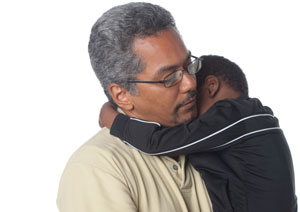Understanding Childhood Grief Responses
By: Rochelle Perper, Ph.D. | December 4, 2013

Children and adolescents grieve differently than adults. Grief occurs in many different circumstances, especially for children. In addition to losing a loved one through death, children grieve when the family has to relocate or change schools. In addition, grief occurs following a traumatic experience, the loss of a relationship, divorce, graduation, the experience of getting ready to leave for college, or having an older sibling leave for college.
The way in which a child grieves is as unique as the child themselves. If you are a parent or care provider you may feel at a loss as to how to understand and manage your child’s grief response. Although a great deal of variability exists, researchers have observed patterns of behavior that are typical for grieving children. The following information will provide you with an overview of what you can expect from your child following a loss and how to comfort him or her.
- Grief occurs in fits and spurts. Typically, children grieve intermittently, whereas the grief responses of adults tend to be more chronic. For example, on the day of the funeral, a 6-year old boy might play happily with toys or with friends. A 10-year girl old might seem more concerned with missing soccer practice than with the death of a cherished relative. This pattern of grieving may seem self-involved, even insensitive at times. When a child takes time out for play or joking, it is likely that he or she may be taking a much-needed break, rather than a signal that they have “moved on.”
- Acting out. Often, a child will express his or her grief through behavior rather than discuss their feelings verbally. For example, a young child might not cry at all, but regress to thumb sucking or bed wetting when they are home with their family. What might be considered a “behavior problem” could be a sign of grief. Bravado, obnoxious jokes or actions, aggressiveness, clinginess, irritability, defiance, or apparent indifference can all be expressions of a child’s grief. Some children may even make efforts to “be strong” for family members or comfort others while setting aside their own needs.
- Displaced grief. A child is likely to express his or her grief in the context of a seemingly unrelated situation. For example, an 8-year old girl may have an exaggerated emotional reaction to an argument that she had with a friend, or a 6-year old boy might act aggressively when a toy is taken away. In these types of situations the child is not likely to have the capacity for insight into the source of their reactions.
- Grief throughout development. As a child develops physically, cognitively, emotionally, and socially, he or she will revisit the loss repeatedly. Over time, new layers of meaning and impact will emerge. Momentous events and setbacks in a child’s life may reopen wounds presumed to have been healed long before.
- Adolescent Grief. Most commonly, adolescents will seek the support of their peers rather than turning to family members to express feelings of loss. Teens may recoil from a comforting hug; laugh inappropriately at a memorial service, or have the desire to distract themselves from stimuli that remind them of the loss.
The following are suggestions on how to help a child or adolescent grieve:
- Answer questions truthfully. Children at any age are likely to have many questions regarding the loss. Depending on the child’s age, he or she will have a limited understanding of what death means. For example, preschool-aged children do not yet understand that death is permanent and are likely to ask questions such as “When are they coming back?” It is helpful to answer these questions honestly, even though it is painful to acknowledge. Trying to soften the truth can backfire by undermining trust and opening the door to worst-case-thinking (“Daddy left because I was bad,” or, “It was my fault she died.”) Be aware that a child may not comprehend what you have said the first time, and will thus ask the same questions repeatedly. Many parents find it helpful to develop a scripted response and use the “broken record” technique when answering difficult questions.
- Avoid euphemisms. Children are likely to take statements literally such as “Daddy is sleeping,” or “Grandma is on vacation.” Use simple language to explain the present facts. For example: “Uncle Al was so sick that his heart stopped working and he died,” or, “Death means everything inside the body stops – a person doesn’t eat, walk, or talk.” Parents or care providers may find it helpful to utilize books or other teaching models to illustrate these concepts.
- Commemorate the loss. Throughout the grieving process, families may choose to commemorate the loss in a way that is personally meaningful to them. Children may find it comforting to write a poem or song or draw a picture. Holding on to a tangible item of the loss or looking at pictures is also helpful for many children. In the cases of a loss by death, encouraging the child to say goodbye in his or her own unique way will promote feelings of competence.
- Be consistent. Whenever possible, try to preserve a child’s routine and keep the promises that are made. When unavoidable changes occur, recognize feelings that could arise as a result. A child may act out or regress during difficult transitions such as moving, going to a new school, or changes in primary care. In such cases, set limits as needed, but show compassion if you believe the behavior is tied to grieving.
- Safely express your emotions. Children learn from adults, and will model their grief responses to how they see others react. When adults suppress their emotions or avoid their grief through alcohol, work, or by other means, children adopt similar behaviors. Sharing your sorrow and other feelings of grief allows children to feel safe enough to express themselves. Be honest while offering reassurances, such as, “I feel so sad and terrible right now but I believe that we will eventually make it through this painful time.” Parents or caregivers may find it especially challenging to support children in their grief while they are grieving themselves. In these times, eliciting support from therapy or through family and friends is recommended. It may be helpful to delegate responsibilities to others such as picking up the kids from school or taking them out for weekend activities. If you are a primary caregiver who is very distraught or depressed, seeking professional help will not only provide you with necessary assistance, but also play a role in your child’s healthy development.
- Play together. For children, time to play during grief is crucial. Children often express feelings and process their loss through play. It is also important for children to have the opportunity to “just be kids” by knowing that it is acceptable to take a break from grief, to have fun again, and remember the loss in a positive light.



